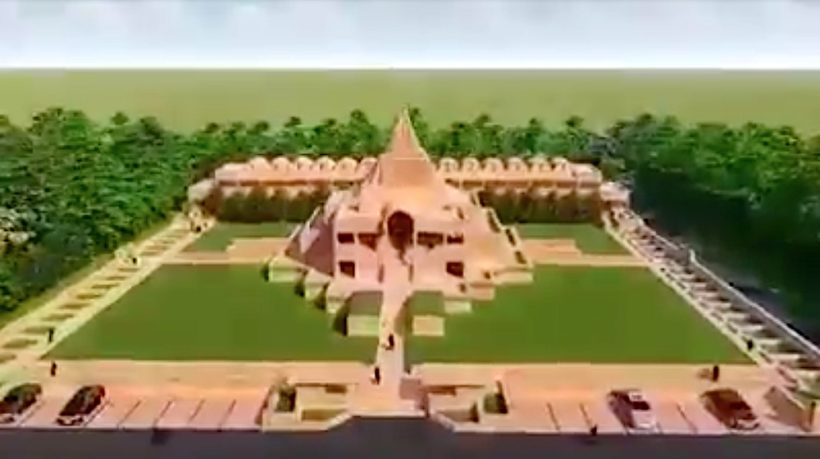Bengali culture/commentary
By Pathik Hasan
“Bangladesh finalizes agreement to build Buddhist monastery in Lumbini, Nepal” This was the headline of Hong Kong-based Global Buddhist Door’s news headline last October 11, 2021. Can anyone imagine that a Muslim country is going to build a Buddhist monastery in Nepal, a country where the majority of the population is Hindu, followed by Buddhists?
Recently a clear-cut example has been established that amongst all countries in the world Bangladesh is the role model of communal harmony in the world. The Bangladesh government has interest and intention to hold Bangladesh as a non-communal Bangladesh. And, Bangladesh can be considered as a champion and role model of communal harmony in the whole world because people have been living here with lasting inter-communal peace and confidence. Bangladesh’s inter-communal harmony is well known to and praised by the world.
The people of Bangladesh believe in the policy “Religion is everyone’s festival; everyone has equal respect for all religions.”
Bangladesh is committed to protect the rights of all groups because the inception and journey of Bangladesh started through the participation from all walks of life from all quarters of society in the great 1971 liberation war. The country’s constitution has obliged Bangladesh to do it. Bangladesh knows it and practices it. No one can deny that. We are Bengali people. The Bengali nation consists of multiple religions. Bengali people hold the spirit of the great 1971 liberation war whose sentiment is more related to inter-communal harmonies.
Bangladesh is a responsible country. It is known to shelter human beings (Rohingyas from Myanmar) and take back its own people to its fold (Chakma people in 1994). Bangladesh wants to ensure perpetual regional peace in the region (in the line with 1997 Chittagong Hill Tracts Peace Accord).
Bangladesh as a secular country always tries to ensure the rights of all ethnic and religious groups and Bengali culture is synonymous with inter-communal harmonies. It is one of the countries in the world where Muslims, Hindus, Christians, Buddhists, various ethnic tribes are trying its best to live together with eternal peace.
But some culprits and criminals are trying to damage the national prestige of Bangladesh in the international arena by committing heinous misdeeds. Now a question arises. But why? Because uncivilized, barbaric perpetrators and propagandists don’t want intercommunal harmony to be implemented. People who have anti-Bangladeshi sentiment in their mindset always seek the time and place. They wait for the golden time to commit and have tried to take advantage of the opportunity. Recent events surrounding Durga Puja celebration in Bangladesh proved it again.
What’s going on in Bangladesh now? Some miscreants spread rumors using social media to destabilize the peace and stability of communal harmony in Bangladesh. The people of Bangladesh have been enjoying the God-given blessings of inter-communal ties. But miscreants who don’t want the development of the country might be behind this. .
Recent incidents regarding the vandalism of Durga idols in Bangladesh created tensions. The people who allegedly committed the crime must be brought under jurisdiction. No one has the right to bother or disturb anyone.
BD PM Sheikh Hasina-led government believes in inter-communal harmony. She always tries her level best to join any religious and cultural program. Anyone can understand that she is committed to ensure the rights of all groups.
However, in Comilla, those who have insulted the Qur’an, attacked and vandalized the puja mandapa don’t symbolize the mindset of the whole Bangladeshi people. Basically, that was mockery, misconception, and terrorism in the name of serving one’s own religion. It is true that each and every religion in the world teaches us tolerance towards others, nonviolence and to be respectful to others. Each and every human being is safe under the shelter of the umbrella of God. The recent Comilla, Chandpur, Chittagong, and Rangpur incidents in Bangladesh are not the symbol of Bangladesh. Bangladesh has more districts and regions and the incidents in the above-mentioned places are pathetic.
Perpetrators must obviously be brought under exemplary punishment. As this could harm the image of Bangladesh as a role model of inter-communal harmony worldwide. I am sure that the Bangladesh government will do that because it is the national policy of the Bangladesh government.
People should be seen as human beings, not religious identities.Those who want to destroy Bangladeshi harmony must be under tribunal. BD Prime Minister has already assured this. Her prompt reaction was seen during her meeting with the Hindu community.
It is in Bangladesh where Mangal Shobhajatra or Mangal Jatra is celebrated at dawn on the first day of the Bengali New Year in Bangladesh, Various religious festivals such as Eid of Muslim community, Pujas of Hindu community, Easter Sunday, Christmas Day of Christian community, Buddha Purnima take place simultaneously. The Muslim festivals of Eid ul-Fitr, Eid ul-Azha, Milad un Nabi, Muharram, Chand raat, Shab-e-Baraat, Bishwa Ijtema; Hindu festivals of Durga Puja and Janmashtami; Buddhist festival of Buddha Purnima; Christian festival of Christmas and secular festivals like Pohela Boishakh, Nabanna, Language Movement Day, Independence Day, Rabindra Jayanti, Nazrul Jayanti witness widespread celebrations and usually are national holidays in Bangladesh. Bengalis and Non-Bengalis in Chittagong Hill Tracts region celebrate together the tribal festivals such as Biju, Sangrai, Baisabi etc. Basically, there is no religious, ethnic boundary in Bangladesh. Everyone is for everyone.
People from all religions and ethnicities are united in Bangladesh. The recent incidents are just separate incidents in Bangladesh.
Please, don’t blame Bangladesh for those separate incidents. Bangladesh is a country of all religious groups.
The article was first published in India’s Sentinel Assam.
About the writer:
Pathik Hasan, Dhaka-based NGO activist and freelance writer on contemporary international issues whose work has been published in many local and international publications. Academic background: BSS and MSS in Peace and Conflict studies under the University of Dhaka. He can be reached at pathikhasan1141@gmail.






